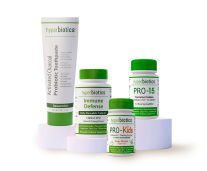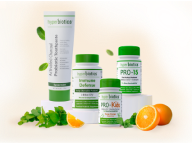There’s nothing more disheartening than doing your best to take care of yourself only to feel like it’s not paying off. After all, it can be discouraging if you’ve been making an effort to eat healthy foods, get enough water, exercise regularly, and take supplements to support energy, only to still feel like you have the stamina of a wet noodle.*
A lot of factors can play into daily energy and well-being. If you’ve been waiting for the effects of all that self-care to kick in for a while now––all while you walk around feeling like a battery that won’t hold a charge––it could be that you’re doing all the right things, only to be undermined by an unbalanced gut microbiome. (1)
What Does the Gut Have to do With Self-Care and Energy?
More than you might expect! Your gut microbiome (the ecosystem of bacteria that live in your gastrointestinal tract) significantly affects the rest of your body. When the bacteria in your gut microbiome are in balance––meaning there’s a mix of about 85% good bacteria to 15% bad––you tend to feel energized.
But when they’re depleted or out of balance due to an unhealthy diet, inadequate sleep, stress, antibiotics, or overzealous cleaning, it affects your whole body.
Here’s what’s happening when your gut is imbalanced: your energy levels become unregulated, leaving you open to peaks and crashes—and setting you up for a spiral of fatigue, which you may try to fix by drinking sugary or chemical-laden energy drinks that deplete your microbiome, leaving you feeling even more tired.
Healthy energy levels are determined by your hormonal balance and how your body works with glucose. When your gut bacteria are in equilibrium, they work with the rest of your body to support healthy hormone distribution at the proper times.
Similarly, certain types of gut bacteria (Lactobacillus and Bifidobacterium) help your body to support healthy blood sugars so that you don't get crazy sugar crashes. But when your gut bacteria are out of balance, your body doesn't get that support, meaning that your hormones and blood sugars are more likely to be all over the place.
Plus, without enough beneficial bacteria, your body can’t absorb the nutrients from all those great foods you’re eating, so it doesn’t have the building blocks it needs for stamina and endurance. (2) And if the bacteria that support your Circadian rhythms are off, chances are you’re not sleeping as well as you could, which has a considerable effect on energy, not to mention overall health. (3)
Probiotics support gut health and make your other self-care efforts pay off.*
Unfortunately, it’s incredibly easy to experience an imbalance in your gut microbiome, even if you're trying to live a healthy lifestyle. Not to mention, getting the proper nutrition, exposure to the right kinds of bacteria, and prebiotic foods your gut needs to thrive is challenging.
That's where probiotic supplements come in.*
How Probiotics Address Energy Issues at the Source*
You might have heard about people taking a probiotic supplement for energy support. And while probiotics have a significant impact on energy, they're not like other supplements––it's not like you take a probiotic and immediately get a surge of energy, followed by the inevitable crash.*
Instead, probiotics address the issue from the ground up: by introducing good bacteria back into your gut microbiome, they can shift the balance of bacteria enough so that the good bacteria can start to take over and crowd out the bad, restoring harmony to your gut. (4)*
This then has a cascading––and lasting––effect on the rest of your body. Among the many benefits of probiotics, they support immune function, healthy inflammatory response, energy, balanced mood, and proper nutrition. (5,6,7,8)*
Plus, supplementing your self-care efforts with probiotics sets you up for a beneficial cycle. No more sabotaging your best-laid plans by trying to eat healthy, only to reach for a sugary energy drink when you hit a wall, or planning out a detailed workout schedule, only to find yourself without the stamina to follow through.*
Want to up the ante even further with your self-care? Try combining probiotic supplements for gut health with these natural energy supporters:*
7 Natural Energy Supporters
-
Chia seeds
These tiny seeds are the definition of “small but mighty”: their ratio of fats, fiber, and protein make them filling but not heavy. Nutrient-dense chia seeds will keep you going for hours due to their ability to expand up to ten times their original size when soaked in water! The resulting gel-like substance slows down your body’s conversion of carbohydrates to sugar, so your food will provide energy to your body for longer. Fun fact: these powerhouse seeds have been used for centuries by the Tarahumara Indians in Mexico to fuel their ultra-long (200+ miles!) runs.
-
Green tea
Love the jolt you get from coffee, but hate the jitters? Try green tea instead. It has enough caffeine to keep you going, but it naturally contains a substance called thymine that cuts the jittery feeling, leaving you feeling alert and focused. Plus, green tea is a prebiotic that helps to fuel your beneficial bacteria—delivering energy on multiple levels.
-
Dark chocolate
Another prebiotic, dark chocolate, contains caffeine but its biggest benefits come from a chemical called epicatechin––it supports blood flow, optimizing the delivery of oxygen throughout your body and making you feel like you're firing on all cylinders.
-
Magnesium*
Magnesium is one of the substances required for producing ATP, which is the substance that transports energy in your cells (not to mention its role as a key player in metabolism). But changes in how food is grown and produced mean we're not getting as much magnesium as we used to. When you add in substances and circumstances that deplete your magnesium levels––sugar and stress, for example––it's easy to become deficient, leaving you with low energy. Consider eating more magnesium-rich foods or taking a magnesium supplement to support energy.*
-
B Vitamins*
B vitamins help your body convert the food you eat into energy; without enough, your body can't benefit the way it needs to from what you eat. Look for a broad-spectrum vitamin B-complex supplement to ensure you're getting all the different types of Bs you need.*
-
A daily probiotic supplement*
Given the modern Western society that we live in, if you haven't been consciously protecting your microbiome for a while, chances are that it's not as healthy as it could be. Consider giving your gut a fresh start with a premium, time-released probiotic formula like Hyperbiotics PRO-15. It's a great way to support your optimal stamina, not to mention make sure your self-care efforts are paying off. Bonus? Some strains of probiotics even produce B vitamins like folate to support energy.*
-
Prebiotics*
Just like you, your good bacteria need quality nutrition to thrive. Prebiotics are foods that break down into substances that feed your good bacteria. There's just one problem: it's tough to get enough of them in your diet. If you want to make your microbiome happy (and experience the energy that comes with that), try adding a scoop of organic prebiotic powder to your daily routine. It's an easy, simple thing to do that can make your good guys—and your energy—take off.*
Summary
Self-care is crucial to supporting your health and well-being, but it's easy to spend a lot of time and energy on it without seeing the results if you haven't gotten your gut on board first. So whatever aspect of your energy you're working on––whether you're looking to support your endurance for athletics or just hoping to get through the 4 PM slump without having to down another coffee—look to your gut. Support it, and it will support you and your self-care goals right back!*
References:
- Endocr Metab Immune Disord Drug Targets. 2014; 14(4):290-9 [PMID: 25022563]
- Science. 2016; 351(6275):854-7 [PMID: 26912894]
- Mol Metab. 2016; 5(12):1175-1186 [PMID: 27900260]
- Methods Mol Biol. 2004; 268:491-502 [PMID: 15156063]
- The Open Nutrition Journal. 2008; 2:68-75
- Nutrients. 2016; 8(4):205 [PMID: 27070637]
- Proc Natl Acad Sci U S A. 2011; 108(38):16050-5 [PMID: 21876150]
- J Physiol Pharmacol. 2011; 62(6):591-9 [PMID: 22314561]
- Nature. 2013; 505(7484):559-63 [PMID: 24336217]
*These statements have not been evaluated by the Food and Drug (FDA) Administration. These products are not intended to diagnose, treat, cure, or prevent any disease.





